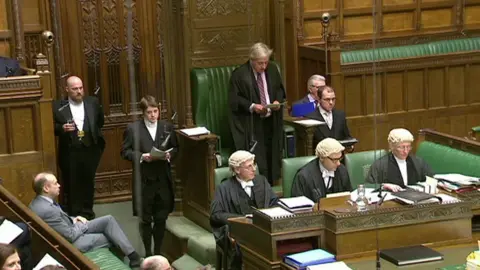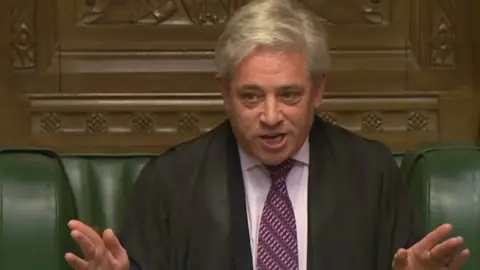Bullying and harassment at the House of Commons
Warning: this report includes strong language
There is a bullying and sexual harassment problem at the House of Commons. Women face greater obstacles holding jobs in the engine room of our democracy than men.
It is a problem that runs from the most obscure of backbench committee rooms through to the most senior of MPs.
The topic raises questions not just about the conduct of members and the processes of the House - but also about John Bercow, the Speaker of the House, himself.
One woman, who has now left the House, told us: "My career at the House of Commons didn't end when I was sexually harassed. My career ended when I complained."
Another, still in post, told us there was a "culture of fear" in the House, as people worry that, if something happens, they will not be looked after.
After dozens of interviews with House current and departed staff, it is clear that a large number of staff members - women, in particular - feel they have no protection from the small minority of MPs who might harass, bully or wish to take advantage of them.
After reviewing hundreds of pages of internal parliamentary HR documents, it is clear the House has an unusual approach to managing personnel.
The group of people that Newsnight has focussed on are people who do not get much attention. Whenever the House of Commons works, so does a team of unacknowledged officials who work directly for Parliament - not any member or party.
Their job is to keep our democracy fair and open.
This cadre, who work for the House of Commons, have a host of titles such as "secretary" and "inquiry manager". But, to other people in Westminster, most of this group of people are known by the title that is, strictly speaking, held by only the most senior among them: the "clerks".
They quietly advise MPs on committees, and advise the Speaker of the House on procedure. Their role is more important than is commonly appreciated. You can easily spot a few wearing wigs in the chamber on special occasions. They are not civil servants, because they work for the House - not the government.
 Stefan Rousseau
Stefan RousseauThese officials are easy prey for MPs, in particular, who decide to harass or bully them. It is a place where women, in particular, struggle to stay the course. While some men get bullied, one woman told us that it was a problem that was "90%" women - an assessment that other people in the House agree with.
Since 2011, there has been a process to protect them from MPs - the "Respect" policy has been in place - but staff have no confidence in it. Women are bullied more and harassed more by male MPs. And if these women complain, they are certain their careers will suffer.
Our legislature - the core of our public life - is a place where talented women are more likely to try to move on to other things, where their impact on our public life will almost certainly be smaller.
One woman said: "All I wanted was to do my job without being humiliated. There are no incentives for people to raise issues."
Another said: "I was bullied out of a job I loved. The MPs were one thing, but I felt so badly let down by the people I worked with directly."
The clerks
Clerks occupy a strange space. They work with MPs, whose authority comes from being elected by the public. And if the MPs work on committees, they are there with a double authority: their positions on committees comes from other MPs voting them onto them.
As a result, when there are workplace problems, there is an inequality in their roles.
Hannah White, who worked as a clerk from 2004 to 2014, said: "From the day that you start working in the House of Commons... there can be situations where you're required to deliver difficult messages and in those circumstances it's seen as very important to be robust."
That is the root of this problem. There is culture among clerks that prizes "resilience". You cannot easily deal with an MP who is unreasonable, so the ideal clerk will be able to cope. They will be "thick-skinned" and have a "stiff upper lip".
But, as Ms White says, "The difficulty is when that extends to when a member behaves inappropriately towards you - you're still expected to just put up with that situation."
This is a culture that contains none of the normal feedback mechanisms that correct workplace behaviour. Clerks put up with actions by MPs that would be deemed unacceptable in any other context. And that allows behaviour to escalate from thoughtlessness into something worse.
On trips abroad, women clerks have told us they have been advised not to accept drinks with MPs. Go to bed promptly. Do not let them in your room. Do not enter theirs. And younger women, in particular, are at risk.
The prevalent attitude is that, as a clerk, if you complain about an MP, your career is likely to suffer. Not theirs. You may be referred to courses on dealing with "difficult" people. Women have told us how, even if you have been subjected to significant workplace bullying or sexual harassment, you risk being seen as "sensitive" or a "troublemaker" if you complain.
Our research points to a particular problem: that, if the House accepts there is a real issue, the usual solution is to move the clerk - not the MP.
A current clerk told us: "There is still a fear about people speaking out because there are recent examples where people end up getting moved or leaving the House in relation to raising these things."
That can be distressing for people who enjoy working with their current team. But it can also mean that people's workplace progression is slowed. It places a particular burden on clerks who have built a specialism that can only be deployed on one committee.
Careers suffering
The problem of women suffering for complaining was a continual refrain from the clerks we interviewed. We spoke to one woman who described being sexually assaulted by an MP in the 1990s, when she was about 20. She was delivering papers to him in his office one evening.
She said: "He manoeuvred me out of his office into the corridor and put his arm around me and kissed me. I can remember trying to fight him off. I was trying to reel back to stop him from reaching me, but it didn't stop him. I told my line manager and nothing happened, so I just left it."
This is not an unfamiliar complaint. Women working in the house have told us about being pushed against walls, forcibly kissed, groped and slapped by MPs much more recently.
One woman told us about how she, a keen baker, had made a birthday cake for a colleague. She was applying the icing, when an MP entered the room.
"I was kneeling, putting the finishing touches on the cake. He came in and stood right over me. I remember he was overbearingly close. He said 'right where you belong. On your knees with a face full of chocolate.' It was so humiliating."
The response from her manager was to conclude: "The best course of action would be to move me from that committee. I didn't want to move. I enjoyed my job. I stayed, but the behaviour didn't stop."
"After that I did everything I could - I was never alone, my colleagues chaperoned me to events. I dressed differently, as I was told… I became much blander around MPs... but whatever you do it doesn't stop that feeling in the pit of your stomach the whole time... you never know who is around the next corner, or who is going to get in a lift with you."
One woman told us: "When I raised a complaint, I knew full well that I'd be the one that would get moved. Despite the fact I loved my job. Raising complaints had a detrimental impact on my career. On reflection, I think it's why I didn't go as far as I would have liked to."
Yet another said: "The lesson I took away was that you shut up. You don't speak up if you have a problem where an MP is concerned. Management would deal with things in a discreet way - which meant telling the person who had been harassed or bullied that they had to do something to change or they would be moved."
Newsnight has heard accounts from women who regard themselves as being victims of that culture - and some who think they were beneficiaries.
We have met women who credit their success to being "compliant" and women who credit their lack of advancement to a willingness to make noise.
The Honourable Member for the Wrekin
Mark Pritchard, the Tory MP for the Wrekin, is notorious for shouting at and berating clerks. Many we spoke to rolled their eyes at the mention of his name.
The bulk of the outbursts we have heard about follow something of a pattern. A clerk will stand up to him, he will fly into a rage, and sometimes complain to their management.
 UK Parliament
UK ParliamentThe circumstances of a committee trip to California in 2007 are particularly notorious. One witness told us about how he berated a female member of staff. "He wasn't happy with the hotel choice. He wanted to stay elsewhere. He exploded, yelled at her."
Another witness explained: "Pritchard wanted a hotel on Santa Monica beach for the California trip, but the Foreign Office wanted him to stay in downtown LA so travel wasn't involved. He threw his papers about and said something like 'you fucking useless women'."
When they finally went on that trip, a witness told us that Mr Pritchard told one official: "You stupid young woman, you haven't got a fucking clue what you're talking about. Who the fuck do you think you are?"
We have been told that Mr Pritchard has also sought to approach clerks' managers to attempt to overturn their decisions and angrily boasted to clerks that their careers were over.
Mr Pritchard himself told us: "I understand, over the past several years the House authorities have addressed numerous complaints about MPs, but they have also informed me they have no record of any complaints against me, and if they had, I would have been notified."
But that brings us back to the core of the issue: staff members are loath to formally complain about any MP.
Managers at the House of Commons would note that, since 2011, there has been a formal process for dealing with complaints by staff against MPs - the so-called "Respect" policy.
But it has faced one stern test - and it came out badly.
The Honourable Member for Newcastle-under-Lyme
Clerks are unanimous about the virtues of Emily Commander, a former clerk. Views on her range from "a future Clerk of the House" to "the best boss I ever had". We heard praise for ability to deal with the minutiae of a topic, run a team, handle a committee, write a report or deal with MPs.
Newsnight has spoken to witnesses who believe that a single member, Paul Farrelly, the Labour MP for Newcastle-under-Lyme, made her continued employment at the House of Commons impossible - a consequence, they say, of years of continued, personal criticism.
 UK Parliament
UK ParliamentOne witness recalls him singling Ms Commander out when they were working on the Science and Technology Committee in the early 2000s. A fellow participant in a committee trip to Italy in November 2004 session recalled his behaviour vividly. "He was a complete and utter bully".
"He wound her up like a screw and reduced her to tears. The more he upset her, the more he enjoyed it, the more he kept turning the screw. He was very aggressive. It felt like no one had the ability or authority to intervene. Everybody knew it was wrong."
Mr Farrelly says he has no memory of Ms Commander being a clerk on this committee.
Mr Farrelly left the Science and Technology Committee in July 2005 for the Culture, Media and Sport Committee. But the two had to work together again: in late 2010, Ms Commander became clerk of the CMS Committee.
This was a major promotion for her: a committee in the midst of the news. The phone-hacking inquiry was going on. This was the committee to which Rupert Murdoch would soon confess to feeling "humbled" - and where he was hit with a foam pie by a protester.
Ms Commander's promotion reflected the House's high regard for her. The report she produced was regarded as "magisterial" by senior officials.
However, documents obtained by Newsnight, show that Ms Commander was forced to step away from the committee for her own health a little more than a year later - a development attributed by her managers to Mr Farrelly's behaviour.
Emails between staff, obtained by Newsnight, show her complaints were of a campaign of continual belittling and undermining, in front of her MPs and in front of her own staff. Eventually, in the words of a colleague, it reached "crisis point". Ms Commander had to step away. One internal document, obtained by Newsnight, contains a summary of her position.
She had told her bosses she had "trouble falling asleep at night… I have been anxious about encountering Mr Farrelly... I have repeated nightmares about going on committee visits with Mr Farrelly and being criticised by him for having neglected tiny details... After particularly unpleasant meetings I have lost my appetite and have on several occasions been physically sick."
A senior clerk, Andrew Kennon, intervened formally in February 2012. Mr Kennon, the clerk in charge of committees, submitted a complaint on her behalf about the MP's behaviour - the first formal complaint about Mr Farrelly.
Mr Kennon's requested solution was that Mr Farrelly be removed from the committee and he write a public apology to her. It was a good test case for the House authorities to show that the then-brand-new complaints process, the Respect policy, which took effect in 2011, could work.
Evidence sifting
As the formal "Respect" process started, it was immediately noted that there had been prior incidents involving Mr Farrelly and two other women working as clerks. Those two other women were asked to provide accounts of what happened.
The first of these two told the House investigation that, on a trip abroad just a few years before, Mr Farrelly had "begun asking me repeated questions about my marital status, my then fiance, wedding plans and other personal matters… It is always difficult to convey when questions of this nature go beyond a mere friendly interest… However, on three separate occasions other Members intervened..."
She added: "On a number of occasions, I noticed my hands shaking before a meeting of the committee. I began to sleep very badly and lost my appetite. My husband and friends wanted me to go to the doctor and be signed off with stress."
She also described how her boss, a senior clerk still working at the House, had told her: "Mr Farrelly was known to be an awful man, or words to that effect, and that he had previously made the lives of female members of staff... very difficult".
The second of the two additional women was also approached about giving evidence - and gave over her testimony.
However, the House authorities decided that "only behaviour which post-dated the adoption of the Respect policy would fall within the scope of the investigation".
The Respect policy, however, was adopted only on June 20 2011. This investigation was initiated in February 2012. So, despite being presented with evidence stretching back eight years, the House authorities decided that, under their own rules, it could only admit the previous eight months.
Both of the other women's accounts were excluded for being too old - even though some were barely two years old and the oldest was eight. The earlier episodes involving Mr Farrelly and Ms Commander, from the trip to Italy, would also have been inadmissible.
The House told Newsnight that this was on the basis of legal advice. Mr Farrelly told Newsnight that the Respect policy "plainly could not investigate complaints about matters predating that policy".
The inquiry
Under the Respect policy, Edward Wood, a House official working in another department, interviewed MPs and staff. The case was soon cast as a battle of wills between staff and MPs.
The Wood inquiry found a curious dynamic: staff believed Ms Commander had been bullied, MPs did not. One MP, cited in the judgment, was quite clear about the sense of taking sides: "I know I'm a member, on the committee, and so on, so I'm not impartial.".
However, another MP was also cited as saying that Mr Farrelly "does have a tendency to bully… He can be very impatient very sharp in his comments".
The Wood report does not come to a conclusion on most of the issues raised in the complaints against Mr Farrelly. In the few cases where Mr Wood was able to make a determination, however, it found that Mr Farrelly had, indeed, bullied Ms Commander.
While he could not prove that Mr Farrelly had intended to be a bully, his behaviour amounted to "an abuse of power or position, unfair treatment and undermining a competent worker by constant criticism… The conduct was offensive and insulting."
As a next step, the case was referred to the House of Commons Commission, a panel of MPs, met on 26 November 2012 to discuss the report and take action.
This group of grandees is chaired by the Speaker, and they organise the running of the House. It was this body, meeting under a different name - the "Members' Estimate Committee" - that used to set MPs' pay and expenses.
But despite the unequivocal findings of the report, the commission decided it could not rule that Mr Farrelly had bullied Ms Commander. They found themselves unable to come to a view.
They also voted to suspend the Respect policy: they argued that "investigations were undertaken by a House of Commons official, who might be considered to have an interest; and members had no right of appeal if a complaint was upheld."
They regarded the system - where the final judgment lay with MPs and which had never been used to sanction an MP - as loaded against MPs. They also decided that the Respect policy lacked the required legal underpinnings to permit any action, so could take none.
The commission invited Ms Commander and Mr Farrelly to enter mediation: an unusual way to deal with bullying and one that was supposed to be voluntary.

But, Newsnight has obtained documents suggesting that, a few weeks later in December 2012, union reps were left with an alarming impression: they had received a warning, transmitted via a senior clerk, that if she did not agree to enter mediation, MPs on the commission might decide that the investigation was wrong, and she had not been bullied after all.
The process petered out. The complaint went away. The House of Commons say Ms Commander is "currently on a career break" from her post. She has emigrated.
Newsnight has contacted Ms Commander for comment.
Andrew Kennon, the senior clerk, who pursued this case on Ms Commander's behalf was himself subject to an inquiry.
Mr Farrelly demanded an investigation into Mr Kennon because, he says, the senior Clerk raised his voice to him and told him to 'shut up'. Mr Farrelly told Newsnight he thought this was "plainly inappropriate" behaviour. The Commons authorities looked into Mr Farrelly's complaint, but it was regarded by senior House managers as a vexatious complaint. They found no "serious misconduct" and resolved the issue by giving Mr Kennon "informal" advice on how to deal with MPs.
Newsnight has found Mr Kennon's name in the paperwork on a string of other grievances, intervening on behalf of bullied women clerks. He is widely assumed by other clerks to have ended his own career by taking these stands.
Any hope of advancement disappeared.
He has now retired.
Newsnight has contacted Mr Kennon for comment.
Mr Farrelly issued a private, though limited, apology to Ms Commander - but it was never published.
Mr Farrelly is still on the Culture, Media and Sport Committee. He quizzed BBC executives just a few weeks ago, in January, about gender within the corporation.
Mr Farrelly denied any bullying. He told Newsnight: "In 2012 allegations were made about me having bullied a clerk to the committee during the compilation of the phone hacking report. These allegations were investigated and not upheld."
"Despite this, I apologised if I had inadvertently upset the clerk who had suffered stress. The policy under which they were investigated was considered to be so unfair to those complained about that it was immediately withdrawn and replaced by another policy."
He told Newsnight that it would, in any case, be inappropriate for MPs to be removed from select committees as a consequence of staff complaints because "MPs are elected either by the whole House or by their political parties to serve on committees".
The Speaker
Mr Bercow is still Speaker of the House of Commons.
He is a key to fixing the culture of the lower house. But we have found that staff lack confidence in him on this topic. He was intimately involved in the Farrelly case. Furthermore, our interviews have uncovered that he personally has a reputation as a bully with staff.
 AFP
AFPKate Emms took a job as his private secretary in May 2010. She had to leave in February 2011. She was signed off sick. Her colleagues have told Newsnight it was because of bullying behaviour by Mr Bercow.
This is hardly a secret: she was then moved to a different role in the House in May 2011 and the operation of the House had to be modified so she would not have to deal with the Speaker. Her new role was modified so that she would not need to speak to him.
It is also no secret that the House authorities were told she had post-traumatic stress disorder.
Colleagues of Ms Emms have told us that she was undermined by Mr Bercow in a range of ways - and seemed to shout at her a lot.
We have habitually asked serving and recently departed clerks if they would like to take the - very senior - role of being the Speaker's private secretary. Their consistent answer? A clear "No".
The House has long struggled to get experienced people to work for him - not least because he has shown his temper to other clerks.
This episode with Ms Emms also left one bizarre memento.
The Speaker's official portrait was commissioned when Ms Emms was in his staff. It was decided that she would be included in the painting.
But there was a long gap between her posing for the artist and the unveiling in September 2011. By then, she had been replaced in the painting. In her place, stood her successor.
The Speaker's spokesperson said: "The Speaker completely and utterly refutes the allegation that he behaved in such a manner, either eight years ago, or at any other time. Any suggestion to the contrary is simply untrue."
They made no comment on the portrait.
Where to now?
When we asked about the problems about the Respect policy, the House stated: "We take the welfare of our staff extremely seriously, and strongly reject any claims to the contrary. In 2014 the House of Commons introduced the revised Respect policy which is specifically designed to combat bullying and harassment of House employees by MPs or their staff."
A reformed Respect policy returned in 2014. The investigations are now conducted by third parties - not clerks - and decisions are now taken by the standards committee, which has non-MPs on it. But it is harder to trigger an inquiry.
They also introduced "training for managers on how to address reports of bullying or harassment and a team of trained bullying and harassment contacts for staff to approach should they have concerns."
They said: "The House of Commons takes pride in being a responsible and supportive employer, and does not tolerate bullying or harassment of any kind. We are unable to comment on any individual cases." When we put it to the House that serving clerks had told us of a "culture of fear", they described this as a "grotesque exaggeration".
But, at the same time, Parliament currently has a working group on bullying and harassment, led by the Leader of the House, which has come to different conclusions. Their work found that: "The evidence, particularly from staff, was that a change in workplace culture is both urgent and essential, and is ultimately the best guarantor of a change in behaviour."
The House working group found that people who had experienced bullying, harassment or sexual harassment were less confident than others that a complaint would be dealt with satisfactorily. The Farrelly case also raises a clear question about retrospectivity. Just as clerks feel the 2011 version of the Respect policy was used to exclude past events, so they fear the ongoing reform efforts will be, too.
And it will remain the case that MPs - this time, on the standards committee - will be the decision-makers on what course of action should be taken.
A system that operates in private is also unlikely to be trusted. It is the case that MPs are appointed in a unique way: they are elected and paid by the public. But, at the moment, the only people who can fire them are not allowed to know about their professional conduct.
Ultimately, staff feel that the system which determines sanctions for MPs must be run externally. MPs will resist that. But it used to be thought unthinkable that MPs' expenses and pay could ever be run by an external body. And it is now.
There also needs to be a marked change in culture. That may be hardest of all. Even a robust system will fail if the clerks continue to believe that their managers think victims should be moved and not heard.
Update 16 October 2018: This article has been updated to include more details about Paul Farrelly's complaint against senior clerk Andrew Kennon.
